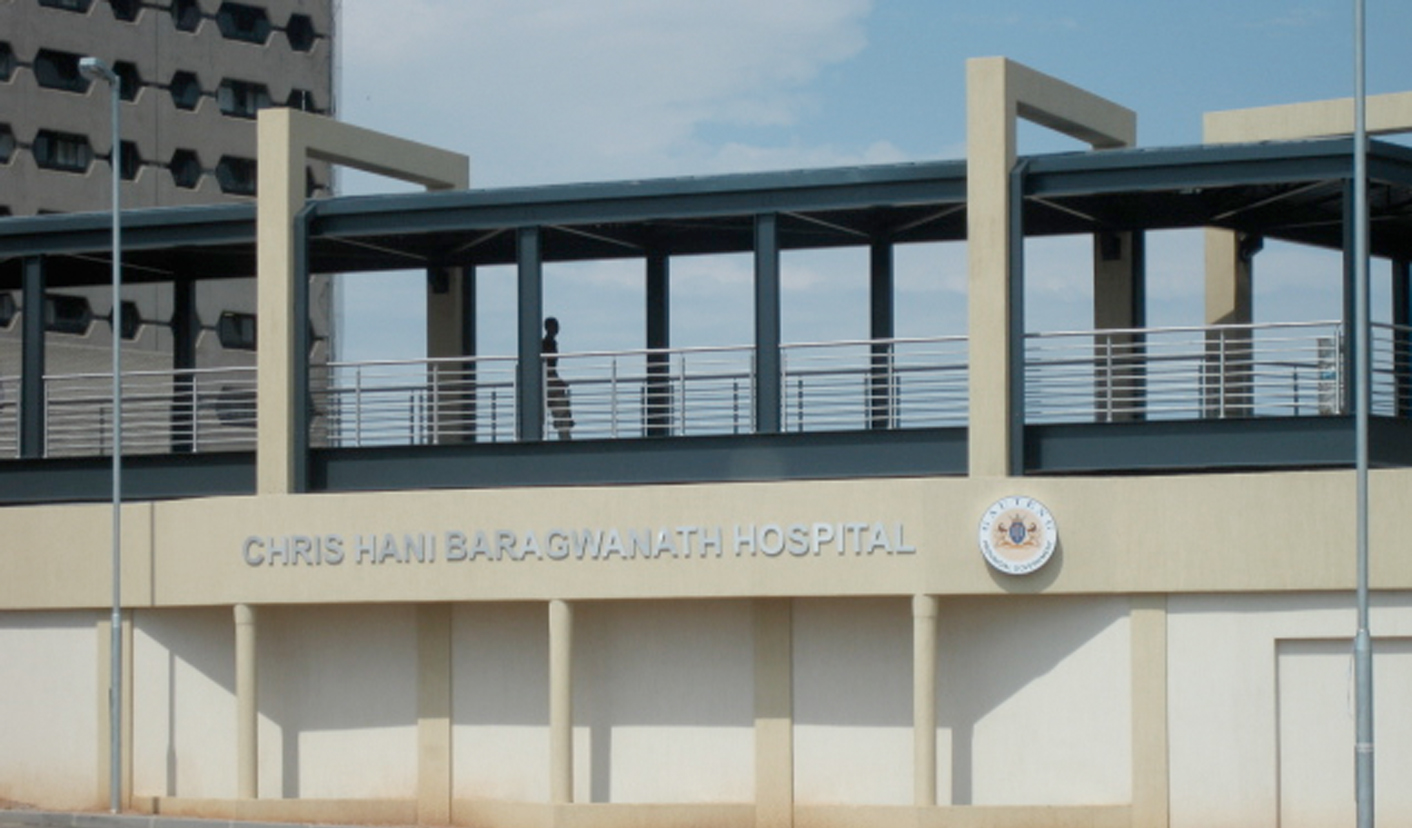“Huge problems at Baragwanath Hospital”. “Baragwanath hospital battling to cope”. “Bara warning bells sounded long ago”. News headlines on Chris Hani Baragwanath are as frequent as they are disturbing. Last week, Daily Maverick’s “Baragwanath's shame: A good man dies” by this reporter added to the onslaught of Bara’s bad publicity with the story of Godfrey Tenehi, who died in agony at the hospital and whose family blame the facility for his horrific death.
The headlines describe a facility in chaotic decline, but what is the lived reality inside the belly of the beast? A Baragwanath clinician agreed to speak to Daily Maverick and offer a doctor’s perspective, on the condition that s/he would not be identified to readers. (A protocol at the facility prohibits clinicians from speaking out without management sanction.)
“Obviously I’ve had negative experiences, but I am still a supporter of government care. I won’t slander the system, but there are management and structural issues,” the clinician says, after being assured that Daily Maverick isn’t after sensational stories and has sought to get an inside view to get closer to the truth about the sprawling, overburdened medical facility. The management of Baragwanath has repeatedly failed to respond to requests for comment or to answer questions about the Tenehi event, despite assurances to the contrary.
“Bara is very special facility because of the complexity of the patients it deals with,” the doctor says, and then explains that the facility is a tertiary hospital, which means that besides serving the massive population of Soweto and its surrounds, it is also a specialist facility to which patients from other smaller hospitals and clinics are referred. Baragwanath also receives referred patients from other provinces and from facilities outside SA’s borders because it is an academic hospital.
“Bara drains Soweto plus the outlying district, and whatever comes from beyond the borders and other provinces,” the doctor says, adding: “You see a range from primary conditions right through to complex disease processes where the intensity of the patient means that you could spend three hours with that patient. The intensity of our central hospital is such that you take the burden of complex disease which requires special investigation or care, regardless of the discipline, because Baragwanath is a major drainage hospital.”
“This means that whether you are taking patient history from the patient, examining the patient, investigating the patient, operating on the patient or treating the patient medically, it is going to take you a longer duration of time because of the type of pattern of disease that you see. It is a fusion of quantity or quality that adds to the complexity, or rather volume and intensity. The volume and intensity combines to make everyday work very busy and more challenging.”
The hours are gruelling and the complexity extremely challenging, but Baragwanath is definitely a plus on clinicians’ CVs. “Unless you are very negative about your medical career, most medical staff feel that you might be miserable because of the hours and the pressure, but the experience you get is unsurpassed. You can walk out of Bara highly trained and receive good recognition. Bara instils good protocols with respect to your approach to patients, and also the standard of care,” the clinician adds.
But just like any other business the employees are only as good as the hospital’s management, in that they are largely dependent on the system and facility to deliver medical care. “It is impossible to have ‘good’ employees when a system like Bara is so poorly managed. I think that’s the crux of every underperforming government department. Everything is falling to pieces. This is not because the people who work on the ground are a problem, but because of the management issues,” the doctor says.
However, Bara’s mentality as a whole, Daily Maverick is told, is that patients will be seen. “People might have to wait very long to be seen there, but you will never not be admitted if you need admission. You might lie in casualty for 24 hours, but from a ground staff perspective there is no limit to who you will or won’t see. You see everyone. Obviously that has a limitation in terms of numbers, but that is a management issue.”
The massive facility is notoriously under-staffed, but this is made even more difficult because of bad management, the doctor says. “Then there are stock issues: a lack of availability of equipment. The budget is poorly managed, stock goes missing and there is stock that is probably around but no one can get access to it because it is poorly managed. That is a management issue, and it definitely affects a patient’s care if you don’t have the right equipment. Maintenance is terrible, but that is a factor in most of our government facilities. A lot of things come to a grinding halt when things are either unsafe or don’t function as they should,” the doctor says, adding: “There is leaking - there isn’t adequate oxygen or whatever else it is that requires maintenance.”
The doctor says it is business as usual at Baragwanath to work and have regular maintenance or equipment issues. Then there’s the matter of never being able to take a personal moment. “It is one of those careers where you have no personal space when you are at work. There are no private areas where you can go to have five minutes, or eat, or attend to a personal matter. You are available and in a patient space for over 24 hours at some periods.”
Because of poor management, clinicians must deal with administration and facility issues which become their problem and take time and resources away from their primary focus, which should be caring for patients. “Administrative and facility issues take a big chunk out of your emotional, mental and physical energy. The issue of access to equipment or timeous therapy or investigative tools creates a lot of delays within patient care, and that is a problem,” the doctor says.
“I don’t think it will take too much to change a system like Baragwanath. As a clinician the saying about Bara is that whatever happens, the facility will always continue. The hospital will always be there. It will always be open. You will always have to make do, even if everything is falling to pieces around you.”
The bottom line is that Chris Hani Baragwanath is in steady decline, but the degree of deterioration isn’t always noticeable on a daily basis. “The decline happens so slowly that you don’t notice it. Then there are the very bad periods, and these are usually towards the end of financial periods or when people or suppliers haven’t been paid.”
Working at Baragwanath isn’t for everyone. “You have to be very passionate about what you do to work there. As in any facility there will be a minority of medical staff that do the wrong thing, but on the whole the clinical staff want to be there, enjoy being there and are very driven workers. They are very driven to achieve outcomes,” the doctor says.
Together with the complexity of patients seen and the vast numbers the hospital has to cater to, hospital mismanagement creates chaos, more particularly in the emergency or trauma sections. “You often run out of equipment, and there is some loss of a sense of order and what could be termed as correct patient care - in terms of waiting times and appropriate provision of medication. It is hard when you have that load, and that much to do, to keep up with everything.”
Speaking to the doctor one gets the sense of a system under siege, in which not all clinical staff are perfect but in which many do extraordinary things. As the doctor says: “It is very hard... it is definitely one of the hardest things I have done in my life and a difficult part of my career. Bara is not a facility to work at for the faint-hearted.” DM
Read more:
- Baragwanath's shame: A good man dies in Daily Maverick
- State doctors: their real, everyday world by Karen Milford at Daily Maverick
- Gauteng faces R235m worth of claims in Sowetan





